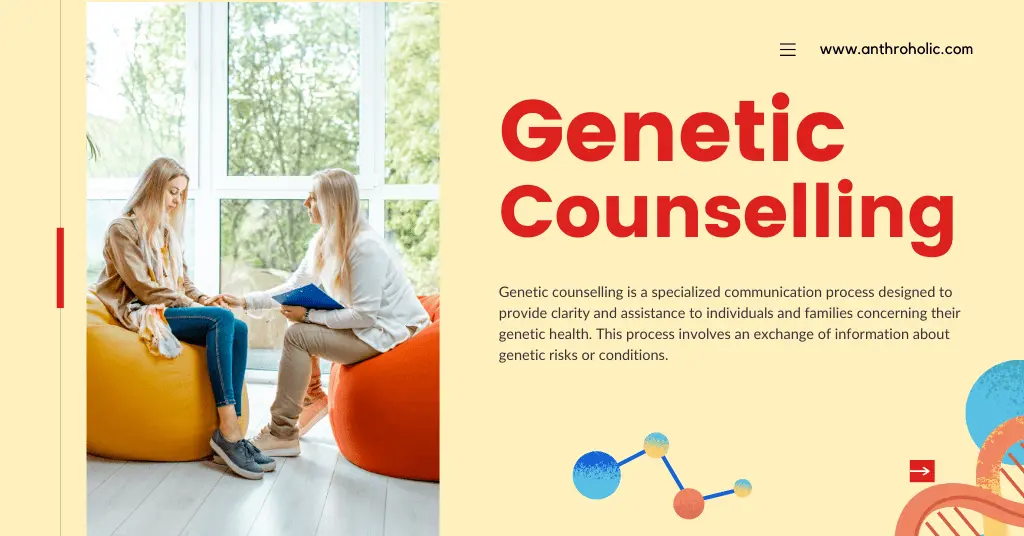AI Answer Evaluation Platform Live Now. Try Free Answer Evaluation Now
Genetic Counselling
Genetic counselling is a specialized communication process designed to provide clarity and assistance to individuals and families concerning their genetic health (American Society of Human Genetics, 1975). This process involves an exchange of information about genetic risks or conditions. Genetic counsellors, the practitioners who facilitate this process, interpret genetic tests and provide education and psychosocial support to help individuals and families understand and adapt to the medical, psychological, and familial implications of genetic contributions to disease.

Purpose and Importance of Genetic Counselling
The importance of genetic counselling cannot be overstated. It provides people with the necessary information and support to make informed medical and personal decisions (Resta et al., 2006). It also encourages individuals to take an active role in their health care and promotes understanding of genetic disease, including its potential impact on the family, the psychological implications, and the decisions that may need to be made as a result of this newfound understanding.
The Role of a Genetic Counsellor
A. Duties and Responsibilities
A genetic counsellor’s main role is to guide and support patients seeking information about their genetic health. Their duties often include conducting detailed personal and family histories, determining the risk of occurrence or recurrence of a genetic condition, discussing testing options and the associated benefits, risks and limitations, and providing resources for further support (National Society of Genetic Counselors, 2020).
B. Necessary Skills and Training
To become a genetic counsellor, one needs to complete a master’s degree in genetic counselling or a related field. In addition to medical and genetic knowledge, they must also possess exceptional interpersonal and communication skills. Importantly, they need the ability to translate complex scientific information into a format that patients can comprehend. Accreditation from the American Board of Genetic Counseling (ABGC) or a similar international body also assures that the counsellor meets the professional standards for practice (ABGC, 2020).
C. Typical Work Environment
Genetic counsellors can work in various settings, including hospitals, clinics, laboratories, and academic institutions. Some may work directly with patients, while others might focus on research, public health initiatives, or educating other healthcare professionals about genetics.
The Process of Genetic Counselling
A. Initial Consultation
The initial consultation often involves a detailed review of the patient’s medical and family history. The counsellor may discuss the reasons for referral, possible outcomes of the consultation, and any fears or expectations the patient might have (McCarthy Veach et al., 2003).
B. Genetic Testing
Genetic testing involves analyzing DNA to identify changes (mutations) that might increase the risk of developing specific diseases or disorders. Genetic counsellors can help individuals understand the implications of genetic testing results, including the likelihood of developing a disease and the options available for managing these risks.
C. Post-Test Counselling
Following the test, the genetic counsellor interprets the results, explains them in understandable language to the patient, and discusses potential next steps. This might include discussions about prevention, surveillance, and treatment strategies, potential implications for other family members, and available resources for further support (Walters et al., 2016).
Uses of Genetic Counselling
A. Preconception and Prenatal Counselling
Genetic counselling is essential before and during pregnancy to assess the risks of hereditary disorders and birth defects. It guides parents about the likelihood of these conditions in their offspring and advises them on the best ways to manage these risks.
B. Cancer Risk Assessment
Through genetic counselling, individuals with a strong family history of cancer can understand their risk of developing the disease. Counsellors can suggest genetic testing to identify specific cancer-associated gene mutations, and discuss strategies for early detection and prevention (Robson et al., 2010).
C. Carrier Screening for Genetic Disorders
Genetic counselling is used to screen for carrier status of certain genetic disorders, such as cystic fibrosis, sickle cell disease, and Tay-Sachs disease. Being a carrier means you have one normal gene and one mutated gene. While carriers usually do not show symptoms of the disorder, they can pass the mutated gene to their children.
D. Neurogenetic Disorders Counselling
Neurogenetic disorders such as Huntington’s disease, Parkinson’s disease, and Alzheimer’s disease also benefit from genetic counselling. Genetic counsellors can assist in the interpretation of the genetic risks, possible testing, and the development of a personalized risk management plan.
E. Personalized Medicine and Pharmacogenomics
Genetic counselling plays a significant role in personalized medicine and pharmacogenomics. It helps patients understand how their genetic makeup can affect the body’s response to specific medications, thus guiding healthcare professionals to customize drug therapy for optimal efficacy and minimal side effects (Relling & Evans, 2015).
Ethical, Legal and Social Issues in Genetic Counselling
A. Ethical Considerations
Genetic counselling faces several ethical issues, including maintaining confidentiality, respecting patient autonomy, ensuring informed consent, and managing potential conflicts of interest. Counsellors must balance these ethical obligations while delivering the highest standard of care (Middleton et al., 2016).
B. Legal and Policy Issues
Legal issues in genetic counselling often revolve around discrimination based on genetic information. The Genetic Information Nondiscrimination Act (GINA) of 2008 in the United States, for instance, prevents discrimination from health insurers and employers based on an individual’s genetic information (National Human Genome Research Institute, 2020).
C. Sociocultural Aspects
Sociocultural aspects in genetic counselling relate to the diverse cultural beliefs, values, and traditions that influence individuals’ perceptions and decisions about their genetic health. Genetic counsellors should have cultural competence to provide sensitive, individualized care (Joseph et al., 2017).
The Future of Genetic Counselling
The future of genetic counselling holds promising advancements and innovations. With the advent of high-throughput technologies, more comprehensive genetic testing is possible, which can lead to more accurate risk assessments and personalized care plans. Artificial intelligence and telemedicine are also emerging as valuable tools in genetic counselling practice. Emerging trends include mainstreaming genetic counselling, where non-genetics healthcare professionals provide basic genetic counselling services. This trend could increase access to genetic services, but also presents challenges, including ensuring these professionals are adequately trained and can provide quality care. Moreover, increasing direct-to-consumer genetic testing also presents new challenges in ensuring consumers fully understand the implications of their results (Middleton et al., 2020).
Conclusion
Genetic counselling is a critical component in managing genetic health. It provides invaluable information, guidance, and support, enabling individuals to make informed decisions regarding their health and that of their families. As genetics continues to transform healthcare, the need for genetic counselling will likely grow. Therefore, increased awareness and further study in this field are highly encouraged to prepare for this imminent change in healthcare dynamics.
References
- American Society of Human Genetics (1975). Genetic counseling. American Journal of Human Genetics, 27(2), 240–242.
- Resta, R., Biesecker, B. B., Bennett, R. L., Blum, S., Hahn, S. E., Strecker, M. N., & Williams, J. L. (2006). A new definition of Genetic Counseling: National Society of Genetic Counselors’ Task Force report. Journal of Genetic Counseling, 15(2), 77–83.
- National Society of Genetic Counselors (2020). Who are genetic counselors? Retrieved from https://www.nsgc.org/page/whoaregcs.
- American Board of Genetic Counseling (2020). Certification. Retrieved from https://www.abgc.net/CERTIFY/About-the-CGC-Credential
- McCarthy Veach, P., LeRoy, B. S., & Bartels, D. M. (2003). Genetic counseling practice: advanced concepts and skills. Journal of Genetic Counseling, 12(5), 353–355.
- Walters, C., Kair, D., & Rauch, S. (2016). Genetics, genomics and perinatal care: An overview for perinatal and neonatal nurses. Journal of Perinatal & Neonatal Nursing, 30(2), 99-111.
- Robson, M. E., Storm, C. D., Weitzel, J., Wollins, D. S., & Offit, K. (2010). American Society of Clinical Oncology policy statement update: genetic and genomic testing for cancer susceptibility. Journal of Clinical Oncology, 28(5), 893–901.
- Relling, M. V., & Evans, W. E. (2015). Pharmacogenomics in the clinic. Nature, 526(7573), 343–350.
- Middleton, A., Patch, C., Wiggins, J., Barnes, K., Crawford, G., Benjamin, C., & Bruce, A. (2016). Position statement on opportunistic genomic screening from the Association of Genetic Nurses and Counsellors (UK and Ireland). European Journal of Human Genetics, 24(8), 1102–1105.
- National Human Genome Research Institute (2020). The Genetic Information Nondiscrimination Act (GINA). Retrieved from https://www.genome.gov/about-genomics/policy-issues/Genetic-Discrimination.
- Joseph, G., Pasick, R., Schillinger, D., Luce, J., Guerra, C., & Cheng, J. K. (2017). Information Mismatch: Cancer Risk Counseling with Diverse Underserved Patients. Journal of Genetic Counseling, 26(5), 1090–1104.
- Middleton, A., Marks, P., Bruce, A., Protheroe-Davies, L. K., King, C., Claber, O., … & Hall, G. (2020). The role of genetic counsellors in genomic healthcare in the United Kingdom: a statement by the Association of Genetic Nurses and Counsellors. European Journal of Human Genetics, 28(6), 695–701.



